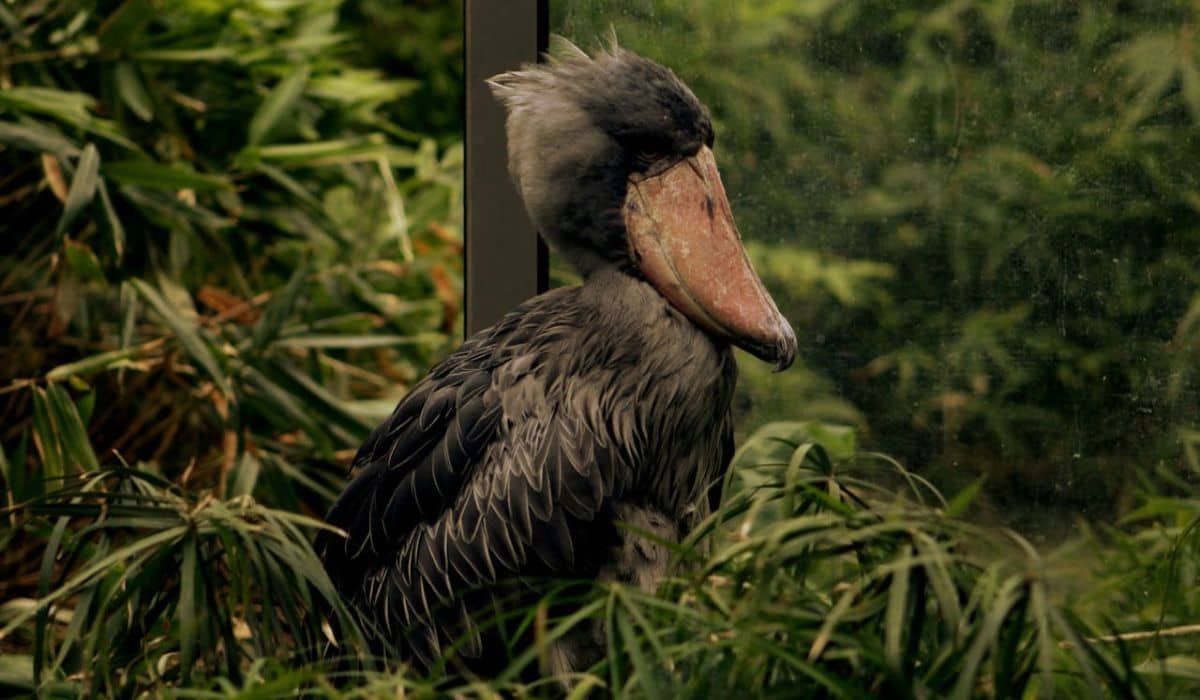
Did you know there’s a bird that sounds like a machine gun? It’s called the Shoebill. It is one of the most rare birds in the world!
Let’s explore this unique bird and discover why it makes such a sound like a machine gun.
What is the Shoebill?

The Shoebill (Balaeniceps rex) is a large bird. It loves to live in the swamps and marshes in Uganda, South Sudan, Zambia, and East Africa.
It is known for its unique call that sounds just like a machine gun firing! This bird that sounds like a machine gun gets its name from its huge, shoe-shaped beak.
Bird That Sounds Like Machine Guns
Key Facts About the Shoebill:
- Scientific Name: Balaeniceps rex
- Habitat: Swamps and marshes in Uganda, South Sudan, Zambia, and East Africa
- Conservation Status: Vulnerable (IUCN Red List)
- Estimated Population: 3,000 to 10,000 in the wild
- Unique Feature: Its call sounds like a machine gun!
Learn more about the Shoebill’s conservation status on the IUCN Red List.
Why Does the Shoebill Sound Like a Machine Gun?
The Shoebill’s call is loud and makes so much noise. It sounds just like a machine gun or jackhammer. But why does this bird that sounds like a machine gun make such an unusual noise? Here are some reasons:
- To find a mate: The loud call helps Shoebills attract partners during the breeding season.
- To defend territory: Shoebills use their sounds to defend their territory from other birds.
- To communicate: Shoebills use their unique call to “talk” with each other.
Listen to Shoebill’s amazing call on the Cornell Lab of Ornithology website
Shoebill Characteristics
Let’s take a closer look at what makes the Shoebill so special:
| Feature | Description |
| Size | Very large, about 4 feet (1.2 meters) tall |
| Color | Mostly gray feathers |
| Beak | Huge and shoe-shaped, giving the bird its name |
| Diet | Mainly fish, frogs, and other small water animals |
| Habitat | Swamps and marshes in East Africa |
How Does the Shoebill Hunt?
The Shoebill has a unique and good hunting style from other birds. It stands still in shallow water, waiting for its prey.
When a fish or frog swims by, the Shoebill strikes fast with its big beak. Its strong beak helps it catch its food easily.
The shoebill’s main diet includes fish, frogs, and other aquatic creatures. It hunts using a method called ambush.
- Diet: Fish, frogs, and small reptiles.
- Hunting technique: Hunts silently and then attacks.
Using this technique they stay very still in one place and wait for prey to come close before quickly snapping it up.
Watch a video of a Shoebill hunting on National Geographic’s YouTube channel.
Shoebill Conservation
The Shoebill is a rare bird that needs our help. There aren’t many left in the wild due to:
- Loss of their swamp homes
- Hunting by humans
- Climate change affecting their habitat
Here’s how we can help protect the bird that sounds like a machine gun:
- Support wildlife conservation groups
- Learn more about Shoebills and share information with others
- Reduce our carbon to help fight climate change
Find out how you can help protect wildlife with the World Wildlife Fund
Conclusion
The Shoebill a bird that sounds like a machine gun is a unique bird. From its unique call to its shoe-shaped beak, this bird is one of the most popular birds in the world. By learning about them we can help this birds future for sure.
Remember, every time you hear about a bird that sounds like a machine gun, you’ll know it’s the Shoebill!
People Also Ask:
Where can I see a Shoebill in real life?
You can see Shoebills in some zoos around the world, like the San Diego Zoo in California, USA. In the wild, they live in the swamps of East Africa, including countries like Uganda and Zambia.
How big is a Shoebill’s beak?
A Shoebill’s beak is up to 24 cm (9.5 inches) long and 20 cm (8 inches) wide.
Are Shoebills dangerous to humans?
Shoebills are not typically dangerous to humans. They’re generally shy birds that prefer to stay away from people. However, like any wild animal, they should be respected and observed from a safe distance.
What do baby Shoebills look like?
Shoebills baby is called chicks. It look like fluffy gray balls with big beaks. As they grow, their beaks get even bigger and more shoe-shaped!
Last Updated: September 14, 2024
Author: Jane Doe, Wildlife Biologist specializing in African bird species

